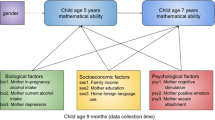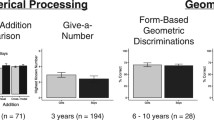Abstract
This study examined the relationship of selected cognitive and affective variables to mathematics achievement for a random sample of 60 students as they progressed through 6th, 8th,10th and 12th grades. A consistent gender difference was found for stereotyping mathematics as a male domain. No consistent significant gender difference between means was found for spatial skills, verbal skill or mathematics achievement. Confidence, verbal skill and spatial visualization were each consistently positively correlated with mathematics achievement for both males and females. No gender difference was found for these correlations. However, spatial skills alone were found to be consistent significant predictors of mathematics achievement for females each year of the study, but not for males. Verbal skill was a consistent significant predictor of mathematics achievement for males, but not for females. The results of this study could lead to a reevaluation of the hypothesis that spatial skills help boys achieve in mathematics.
Similar content being viewed by others
References
Aiken, L. R.: 1971, ‘Intellectual variables and mathematics achievement: directions for research’,Journal of School Psychology 9, 201–212.
Armstrong, J.M.: 1985, ‘A national assessment of participation and achievement of women in mathematics’, in S.F. Chipman, L.R. Brush and D.M. Wilson (eds.),Women and Mathematics: Balancing the Equation, Erlbaum, Hillsdale, New Jersey, pp. 59–94.
Bennett, G. K., H.G. Seashore, and A.G. Wesman: 1973,Differential Aptitude Tests: Administrator's Handbook, The Psychological Corporation, New York.
Educational Testing Service: 1979,Sequential Test of Educational Progress: Mathematics Basic Concepts, CTB/McGraw- Hill, Monterey, California.
Ekstrom, R. B., J. W. French, and H. H. Harmon: 1976,Manual for Kit of Factor-referenced Cognitive Tests, Educational Testing Service, Princeton, New Jersey.
Fennema, E. and J. Sherman: 1976, ‘Fennema- Sherman mathematics attitude sales: Instruments designed to measure attitudes toward the learning of mathematics by females and males’, inJSAS Catalog of Selected Documents in Psychology 6, 31. (Ms. No. 1225) (Reprinted by Wisconsin Center for Education Research, University of Wisconsin-Madison).
Fennema, E. and J. Sherman: 1977, ‘Sex-related differences in mathematics achievement, spatial visualization and affective factors’,American Education Research Journal 14(1), 51–71.
Houghton Mifflin Company: 1971,Tests of Academic Progress (Form S, Mathematics, grades 9–12), Houghton Mifflin Company, Boston.
Hyde, J. S., E. Fennema, and S. J. Lamon: 1990, ‘Gender differences in mathematics performance: a meta-analysis’,Psychology Bulletin 107, 139–155.
Hyde, J. S. and M. C. Linn: 1988, ‘Gender differences in verbal ability: a meta-analysis’,Psychology Bulletin 104, 53–69.
Leder, G.C.: 1990, ‘Gender differences in mathematics: an overview’, in E. Fennema and G. Leder (eds.),Mathematics and Gender: Influences on Teachers and Students, Teachers' College Press, New York, pp. 10–26.
Maccoby, E.E. and C. Jacklin N.: 1974,The Pyschology of Sex Differences, Stanford University Press.
McGee, M. G.: 1979, ‘Human spatial abilities: psychometric studies and environmental, genetic, hormonal, and neurological influences’,Psychological Bulletin 86(5, 889–918.
Meyer, M.R. and M. S. Koehler: 1990, ‘Internal influences on gender differences in mathematics’, in E. Fennema and G. Leder (eds.),Mathematics and Gender: Influences on Teachers and Students, Teachers' College Press, New York, pp. 60–95.
Naslund, R. A., L. P. Thorpe and D. W. LaFever: 1971,Manual for Mathematics Concepts, Science Research Associates, Chicago.
Tartre, L. A.: 1990, ‘Spatial skills, gender and mathematics’, in E. Fennema and Leder, G. (eds.),Mathematics and gender: Influences on Teachers and Students, Teachers' College Press, New York, pp. 27–59.
Thorndike, R. L. and E. Hagen: 1975,Manual for the Cognitive Abilities Test, (Form 1, Levels A–H), Houghton-Mifflin, Boston.
Author information
Authors and Affiliations
Rights and permissions
About this article
Cite this article
Tartre, L.A., Fennema, E. Mathematics achievement and gender: A longitudinal study of selected cognitive and affective variables [grades 6–12]. Educ Stud Math 28, 199–217 (1995). https://doi.org/10.1007/BF01274173
Issue Date:
DOI: https://doi.org/10.1007/BF01274173




